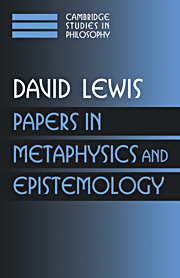Book contents
- Frontmatter
- Contents
- Introduction
- 1 New work for a theory of universals
- 2 Putnam's paradox
- 3 Against structural universals
- 4 A Comment on Armstrong and Forrest
- 5 Extrinsic properties
- 6 Defining ‘intrinsic’ (with Rae Langton)
- 7 Finkish dispositions
- 8 Noneism or allism?
- 9 Many, but almost one
- 10 Casati and Varzi on holes (with Stephanie Lewis)
- 11 Rearrangement of particles: Reply to Lowe
- 12 Armstrong on combinatorial possibility
- 13 A world of truthmakers?
- 14 Maudlin and modal mystery
- 15 Humean Supervenience debugged
- 16 Psychophysical and theoretical identifications
- 17 What experience teaches
- 18 Reduction of mind
- 19 Should a materialist believe in qualia?
- 20 Naming the colours
- 21 Percepts and color mosaics in visual experience
- 22 Individuation by acquaintance and by stipulation
- 23 Why conditionalize?
- 24 What puzzling Pierre does not believe
- 25 Elusive knowledge
- Index
2 - Putnam's paradox
Published online by Cambridge University Press: 08 February 2010
- Frontmatter
- Contents
- Introduction
- 1 New work for a theory of universals
- 2 Putnam's paradox
- 3 Against structural universals
- 4 A Comment on Armstrong and Forrest
- 5 Extrinsic properties
- 6 Defining ‘intrinsic’ (with Rae Langton)
- 7 Finkish dispositions
- 8 Noneism or allism?
- 9 Many, but almost one
- 10 Casati and Varzi on holes (with Stephanie Lewis)
- 11 Rearrangement of particles: Reply to Lowe
- 12 Armstrong on combinatorial possibility
- 13 A world of truthmakers?
- 14 Maudlin and modal mystery
- 15 Humean Supervenience debugged
- 16 Psychophysical and theoretical identifications
- 17 What experience teaches
- 18 Reduction of mind
- 19 Should a materialist believe in qualia?
- 20 Naming the colours
- 21 Percepts and color mosaics in visual experience
- 22 Individuation by acquaintance and by stipulation
- 23 Why conditionalize?
- 24 What puzzling Pierre does not believe
- 25 Elusive knowledge
- Index
Summary
INTRODUCTION
Hilary Putnam has devised a bomb that threatens to devastate the realist philosophy we know and love. He explains how he has learned to stop worrying and love the bomb. He welcomes the new order that it would bring (RT&H, Preface). But we who still live in the target area do not agree. The bomb must be banned.
Putnam's thesis (the bomb) is that, in virtue of considerations from the theory of reference, it makes no sense to suppose that an empirically ideal theory, as verified as can be, might nevertheless be false because the world is not the way the theory says it is. The reason given is, roughly, that there is no semantic glue to stick our words onto their referents, and so reference is very much up for grabs; but there is one force constraining reference, and that is our intention to refer in such a way that we come out right; and there is no countervailing force; and the world, no matter what it is like (almost), will afford some scheme of reference that makes us come out right; so how can we fail to come out right?
Putnam's thesis is incredible. We are in the presence of paradox, as surely as when we meet the man who offers us a proof that there are no people, and in particular that he himself does not exist. It is out of the question to follow the argument where it leads.
Information
- Type
- Chapter
- Information
- Papers in Metaphysics and Epistemology , pp. 56 - 77Publisher: Cambridge University PressPrint publication year: 1999
Accessibility standard: Unknown
Why this information is here
This section outlines the accessibility features of this content - including support for screen readers, full keyboard navigation and high-contrast display options. This may not be relevant for you.Accessibility Information
- 11
- Cited by
